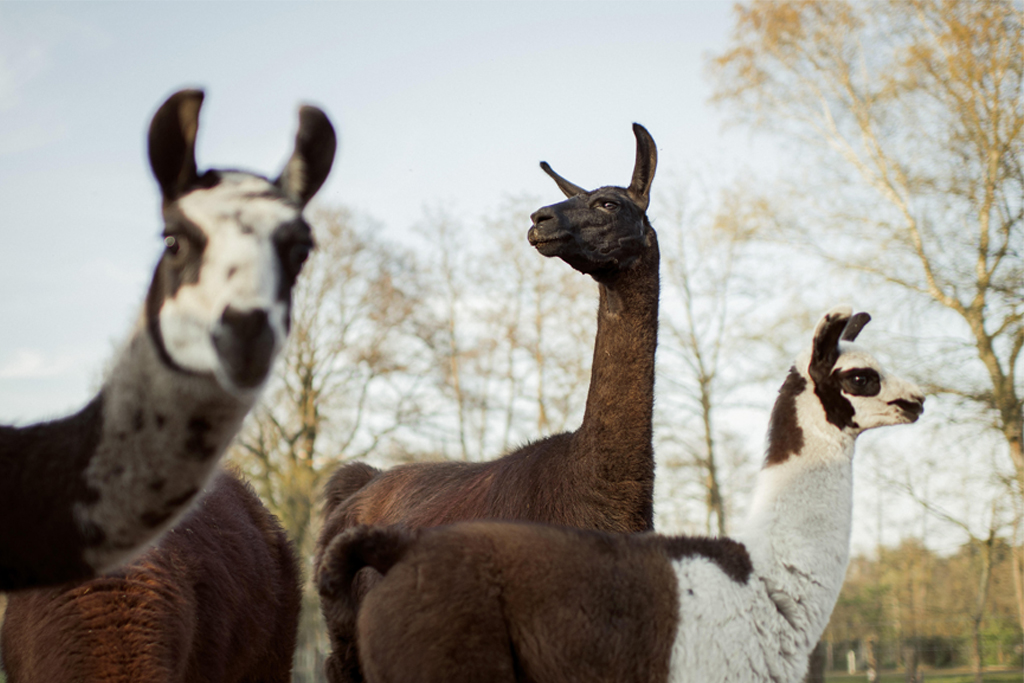Header Image: Winter the llama (middle) ©Tim Coppens
Belgian biotechnology has been closely linked with camelid creatures such as llamas since the incredible properties of their antibodies were uncovered by a serendipitous discovery back in 1989. During a student-run project, researchers at VUB found that llamas, like sharks, have exceptionally small antibodies with just a single domain, which are still able to bind to a specific antigen. Their small size led to the term ‘nanobodies’ and makes them stable, easy to isolate and allows them to be simply and cheaply produced in bulk using bacterial cultures or yeasts. And, unlike sharks, llamas are pretty easy to work with.
The nanobody field has already resulted in multiple companies, including Belgian biotech giants Ablynx (acquired by Sanofi in 2018 for €3.9 billion) and argenx (current market value just under €10 billion). Now, a new VIB spin-off called ExeVir Bio has emerged, aiming to leverage nanobody technology in the fight against COVID-19.
ExeVir Bio has been fast tracked with €23 million to take its lead drug into the clinic by the end of the year… the start-up and its backers think their nanobody approach has advantages over regular antibodies.
ExeVir’s technology platform was developed by VIB-UGent scientists, Professors Xavier Saelens and Nico Callewaert, with the help of several national and international scientific collaborators. Saelens and Callewaert have both been working in the nanobody field for many years. Back in 2016, Saelens injected a llama named Winter with proteins from two older coronaviruses, MERS and SARS-CoV-1, to see if the llama would develop protective antibodies.
Winter indeed developed antibodies that were able to neutralize the coronaviruses by binding to the surface “spike” protein. In the SARS-CoV-1 virus, this resulted in the virus no longer being able to attach itself to the host cells, preventing it from entering the cells and multiplying. At the time, this was considered a promising potential therapy, but developing the technology further wasn’t deemed a priority. That is, until early 2020, when the world went mad with the COVID-19 pandemic.
A who’s who of Belgian biotech
Once the threat of the new SARS-CoV-2 virus because painfully evident, Saelens and Callewaert’s labs kicked into overdrive. They worked days, nights and weekends to see if Winter’s antibodies could potentially be used to combat this global threat. To their immense satisfaction, the data all seemed to support their hopes: the nanobodies were able to protect against COVID-19 in animal experiments using hamsters (research published in the journal Cell). The VIB spin-off ExeVir Bio was rapidly formed to develop the therapy further and bring it into the clinic.
A who’s who of Belgian biopharma came together to get the project underway, including VIB (the life sciences institute behind nanobody biotechs Ablynx, argenx, Biotalys and Confo Therapeutics), pharmaceutical company UCB (which helped make a lead asset and produce clinical batches). Fund+ (which backed Ogeda on route to its €500 million takeover by Astellas) led the Series A with further input from UCB Ventures, the Belgian government and V-Bio Ventures (which also funds nanobody companies Confo Therapeutics, Camel-IDS and AgomAb).
Read this previous BioVox article for more on Confo Therapeutics.
The resulting company ExeVir Bio has been fast tracked with €23 million to take its lead drug into the clinic by the end of the year. That timeline puts ExeVir behind other front-runners in the race to get a SARS-CoV-2 antibody to market, but the start-up and its backers think their nanobody approach has advantages over regular antibodies.
Fighting COVID-19 with nanobodies
According to the World Health Organization, more than 30 different synthetic antibodies are currently being tested in humans, both for prevention and treatment of COVID-19. Large pharmaceutical companies such as Eli Lilly and Roche/Regeneron are even already in the final clinical phases, and aim to bring their antibodies to the market by the end of this year. Compared to these powerhouses of drug development, ExeVir has had a slow start.
However, the specific characteristics of the tiny camelid nanobodies may provide key advantages as compared with much larger human antibodies. Nanobodies can be nebulized and given as a mist via an inhaler, making them well suited to the treatment of respiratory diseases such as COVID-19. The molecules are also stable enough to cope with prolonged storage, meaning that countries could stockpile nanobody therapies to facilitate rapid responses in future coronavirus outbreaks.
We are confident our Llama-derived antibodies hold a key to saving the lives of patients who can become seriously ill with coronavirus. – Torsten Mummenbrauer
Detractors of the technology have pointed out that, even with an accelerated R&D timeline, ExeVir isn’t likely to gain approval for its therapy until after the finalization of COVID-19 vaccines. Even this doesn’t faze the start-up though, with Saelens pointing out that mass vaccination programs take time to complete; it will not be possible to vaccinate the entire world population immediately
Furthermore, it takes a few weeks after vaccination for antibody production to start, meaning that people are only protected from the disease a few weeks after the initial inoculation. Nanobodies, by contrast, should be effective immediately. Nanobodies should therefore be able to play a vital role as both a therapy and prophylactic, isolating outbreaks and providing protection to healthcare workers and other at-risk populations.
As Torsten Mummenbrauer, CEO of ExeVir Bio, says: “We are confident our Llama-derived antibodies hold a key to saving the lives of patients who can become seriously ill with coronavirus.”


